On the Great Himalayan Road Journey to Baltistan, today is the showdown, the final journey continuing from
Road will tell you- III
Remember me with a Lotus- IV
The Gun Mountains and other Gods- V
The Wait of Baltistan- VI
: ँ :
—

It was more difficult to reach here than i had thought. To an extent I was only one night away from leaving it all and going back home.
A whole day had gone in repairing Tyre and servicing this vehicle in Diskit, the same valley that hosted gypsies once, ancient travellers, porters coming from Turkey, Iran, Afghanistan carrying opium and other magic potions to the cold desert of Hunder; a stop that they still talk about as the Silk road. This was the ancient Silk route, and from here you either go up to Mongolia or find your way to the Tibetan plateau into China. I took to Baltistan.

“And had Turtuk not pulled me in this one time, I may not have ever gone there again”.
Because the aim was to meet my children, this little village of Love where I had set myself free ten years ago. It was this where I sensed, touched and ate freedom away from my own compulsive upbringing. That nest which I left to teach, kept becoming an example of what I would like to make of this world.

River Shyok Entering Paktisan
From 2010-11 Diary
Winters used to be the days of leisure. Without electricity, phone, or any other means of digital distraction, whole village used to sit outside under sun chirping, laughing, observing, talking, sunbathing and cooking for each other.
For when we arrived, there was nothing but happiness arriving in Turtuk. We got a heroes welcome yesterday. And it felt that there was nothing more intriguing, more important that had happened in the long barren history of this region than us, teachers arriving.
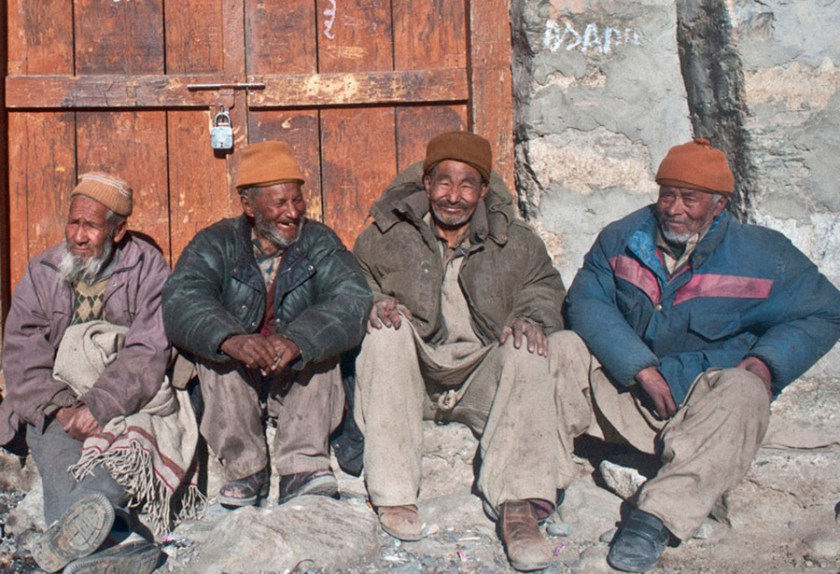

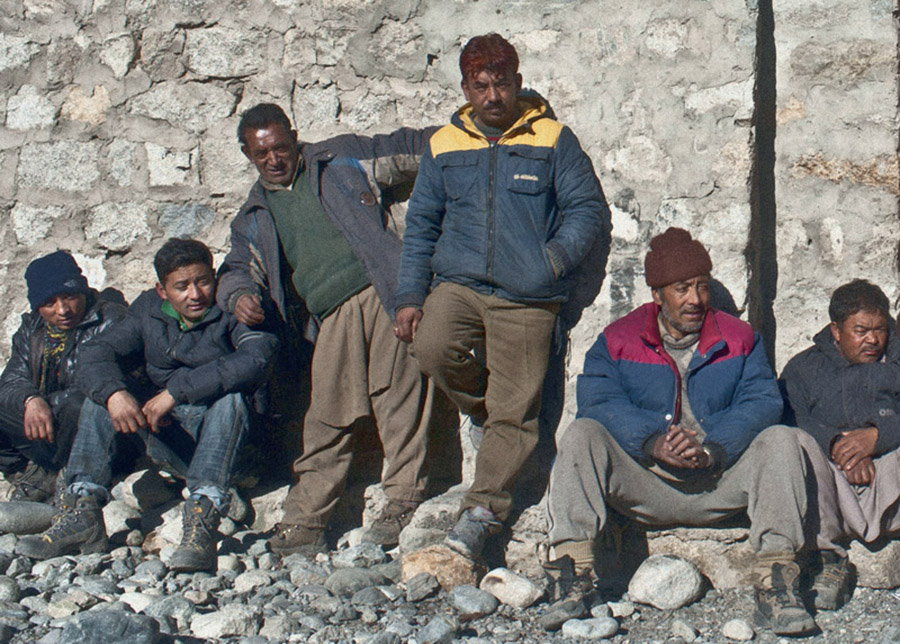

: ँ :
Looking back, we were the empty pots waiting, wanting to be filled by the best means. And like most times, filling happened in the freezing cold of the night, at our home, granted to us by the village elders. ‘Teachers home’ became a community centre where each night someone or the other used to come carrying some gifts of love; apricots mostly, from their fields to sit with us and share tales of their own history, of this forbidden region.
One night an old, old man arrived. White long beard. And When he arrived other locals stood, gave him space. We also stood. He walked with a stick, kept smiling; we were told that he could hardly hear but was a renowned storyteller. It was night and electricity had just left. The kerosene lamplight was brought in, once his face was well lit, he started measuring words with great weight and precision, unfolding a tale that started with a popular amongst locals name, tera poodi or 13 chapatis. “In those days hardly anyone used to come to our villages. In winters it used to get so cold that we would never leave homes without our traditional fire pot kept under our clothes on our bellies. That age of cold has long gone, it is no cold anymore, ‘though we sat under our blankets with layers of clothes on us,’ he continued, it’s only a child’s play today! There were no roads and all ration, supplies used to come by air. The room was packed and quiet, hearing the old man’s tale about to start, and while in between sentences he was quiet, his hands could be seen shadow talking on the walls. Once I was sitting on the roof around noon looking at the sky, high up as the army helicopters were passing by making much noise, when one, two, three, four large Cans of may be fifty or hundred litre each, fell like fruits from the sky, in the field outside just in front of me. I hurriedly went down, without my shoes, no socks, I cut open the cans and the moment I smelled; my soul took me back to Rawalpindi, now in Pakistan. Nostalgia struck me. Face of my wife came standing in front like it was she who had sent it for me, all her love; all those decades ago when we had cows, and we used to drink their sweet milk, ate food with pure desi ghee. And here in my field after all these years I was blessed with four huge cans of pure desi cow ghee. I couldn’t help but stripped myself naked, I cut open all the cans, ate it as much as i could and later poured all that ghee on myself, I literally swam in it. Next day I called everyone from the village and we had a mass celebration, we prepared food, and god knows what happened that day, I ate the most Pudis a man had ever eaten till now, and since then everyone started calling me Tera Pudi Ka i.e 13 chapati baba. It was the last time my wife had done something for me. Even though I never saw her again, never heard from her ever since partition happened. For a while the silence filled the room”.
What happened that night baba? How come you were here, I asked. Someone shouted the question in his ear.
I had come here to buy apricots for my daughters wedding but god had some other plans. Overnight everything changed. The next morning as i got up, getting ready to leave, they said i cannot go anywhere, and ever since then I am here. We are here! And now you are here, looking at us, everybody laughed.
It was last time, he said, when i had looked to the sky thanking not the god but my wife. i knew it was her who had sent this all for me” 13 poodi baba was all teary eyed for a while, all quiet even though our cook Abraham, standing beside him, blushing so hard that we had to ask, it was then learnt that 13 poodi baba was his grandfather. While leaving he blessed us each and was so happy and even proud that his son will be feeding us for six months to come. I was so mesmerised with the grandfather that I went to meet him the next day and photographed him at his home.

Present Day
We had named our project ‘Teach to Learn’ but it seemed after the first, second, and third week that it wasn’t the education these children needed. No body was ever serious apart from handful of students, to an extent I had to learn many a sentences from their language to break the barrier, to be seen as even, but it felt that it was something else they were interested in. Of course they had not seen anyone like us, we were interacting, walking, laughing, sleeping on the banks of the river, taking classes outside, to an extent I had written a theatre play for the children to enact on the republic day of 26th January 2011. But these children were different in many ways, they seemed to have embodied the burden of a prolonged denial of any kind of fulfilment. They carried a strange kind of gloom, plain sadness under their peach like faces. We found many children who were psychologically ill whom no body ever tended to. Some were quiet and almost never responded. Some laughed abnormally. For first few weeks I was nothing but probably only a comedian whose actions could be understood but not the language because certainly I was different, we teachers looked different. And it was this understanding with which we opened our home for the students and anybody could come in the evening. But once that started, there came many other challenges.
We were slowly getting to know many things that could never be known to an outside visitor. There were problems in the village, and more than problems the village ran on rumours. Even in the village there was a section of people who was quietly opposing us. This education drive. Who were we? Why are we here? What purpose? The ones who never wanted any kind of education to happen or upliftment of their women were slowly conspiring against us. We would not know but 180 days later it would bring an almost bomb on us.

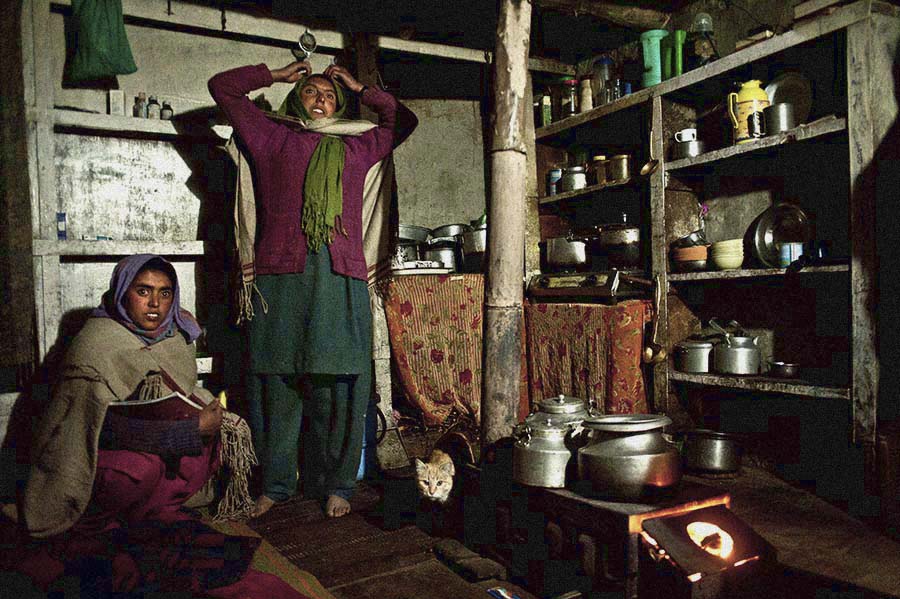

: ँ :
I realised that amongst all teachers I was the most outgoing of them all. Meeting, talking, always walking with my camera, showing up and being seen all day long, that i had earned few children’s trust and they had made me their personal mentor. They started walking along with me from day to night that it became almost impossible for me to be alone. Hence I started getting up very early in the morning to go on walks, daily for an hour around the village before going to school. That was a liberating time as whole valley slept while I walked.
It was this one time while I was passing through a narrow lane to go to the next village, when my eyes fell on a dog standing abnormally still at the far end. Something felt not right. Ice like he stood. Eerily still. I was getting closer when I saw a nail, an iron nail was forced inside from the top of his head. It had made him unconscious. And from that nail, a thin wire had been wrapped. Two children were pulling it just so mildly, just to poke enough so that the dog must not go to sleep. But the dog had gone to some other sleep. It had broken his central nervous system. He was dead already, but breathing. I came heavily on children to explain what were they doing. They unapologetically exclaimed that he ate their chicken and that they will kill him. I yelled, that you have killed him already, he is dead. Now leave, go home!
That morning changed something in me, as somehow I had started to see the deep rooted violence seeped in the subconscious of this society. It was being lived collectively inside each one’s heart, erupting in various unexpected, unnerving forms.

It was a world living in a century of rocks and stones. And like the name of our Project ‘Teach to Learn’, we were learning not about the man more but about our own collective nature.
No one in the village had ever seen a train, or the sea, ever. The faces and the age lines of the old narrated untold, never spoken stories of the past. Stories rather have become these lines. Everybody yearned to talk, tales of their rich history that they were carrying for so long that its weight could be seen in their eyes sulking due to the biting cold.

Their hands like animal leather and fingers square from the tip. The silence here had a frustration that had thickened into a deep-rooted helplessness. The children had no future, majority of the newborn died due to unavailability of any medical station. There was no work apart from becoming a porter for the army, going to the highest posts risking their lives even more or taking up agriculture which had seen no improvement in last so many decades. Caught in a melancholic shuttling between a sorrow for the past and a longing for a better future, they needed education to change their lives.

: ँ :
Yet, we made the most of our times with the children and similarly with the families. We made sure to pass the best of knowledge that we had. I will share something I had never spoken about but it was this one incident that changed my sight and had been growing me ever since.
We were in our third month of teaching and by now I had a certain sense of an understanding about which student is serious and which ones are not attentive enough to spend time on. As our each hour was important, we teachers had discussed to put our energies on, more so to build certain children who could carry on this change once we leave. There was this girl, who probably was the most quiet, unintelligent women in my class. Since my first class, many a times because of her I had to repeat many a lessons but even then she could not really answer me ever. It had made me dislike her to an extent that I had started being a little rude to her, as she would never speak. During that time, we were also in talks with the army to give us some books, old newspapers, supply us with kerosene, wood to warm class rooms and most importantly to give us sports materials. A week later when everything had arrived, we took out children to the ground to play basketball and later volley ball. And to not only my surprise but each teacher’s that girl came out to be by far the best athlete we would meet in Turtuk. It opened my eyes at least, my world to an extent that I have never in my teacher career since then overlooked a child.

: ँ :
Realisations, Friendships and Habits
Living in Baltistan acted like a mirror to my consciousness. Because in whole valley, there was not a single mirror at any home. No one used it. And to not see oneself for six months, slowly, strangely helped in unknowing me, of what I had known till then of my physical self slowly started melting away to more important learnings. Somehow I also realised how important was that time, even in that freezing cold, when other teachers were keeping bottles in their sleeping bags for not even going to pee outside, or some to warm themselves, I made notes, I wrote almost each day, in the morning, evening, night, on the banks of the river, in school, on the roof of our home, I wrote. I never felt to use any hot water bottle to warm myself, nor to pee in my sleeping bag. But it was rather hard in other areas like food. I was probably the only vegetarian in whole valley at that time. May be apart from some Indian Army soldiers but I know I was the only kind there. Never in my entire life I had to explain myself this much, why. As it was almost daily at one or the other household who used to invite us felt compelled to make something different for me and well I obliged. I had no problem if they were finding ways to feed me.

Jain saab, one of the teacher there and I were once lying on the ground near the river. We were looking towards the sky, when he asked me, Narayan what color do you see the sky in? Surprised, I asked back, Jain saab, what color do you see it in? He said, Pink. He continued saying that sometimes some colours confuse him, that he had been wearing a pink jacket all winters thinking it was blue. And it was him who started the end of our days in Baltistan. Jain saab was a quirky fellow, and one would hardly come across a second person like him. May be we all were in our ways, who came to teach these children but he was more. Being a Jain, he would not eat meat- the one which was slaughtered and killed as meat but he had decided to eat whatever he might find already dead in the wild. On one of his excursions Jain saab found dead I-bex. An endangered animal in those areas, and which was sacred to the Baltis. He once brought it at our home secretly. Abraham denied to cook it, and even advised us not to, going against it one night other teachers decided to cook it. Baltis, as villagers were ancient dwellers, within hours some neighbours even arrived asking rather confirming that it is the gosht of an I-bex. It was a strange feeling which somehow just fell short of being sour as the next day those winter’s first snow changed each one’s eyes.

My first snowfall was again Life changing. I may still write it as one of the most beautiful day of my life. The harsh, cold brown earth vanished and every possible thing turned to white. Whole valley changed within hours. Our route to school became a skating way for the children. Out of unconfined happiness, we declared holiday after conducting the morning prayers, just to maintain the decorum. I even took a photograph of our school prayer for memory, just for myself so that i remember.
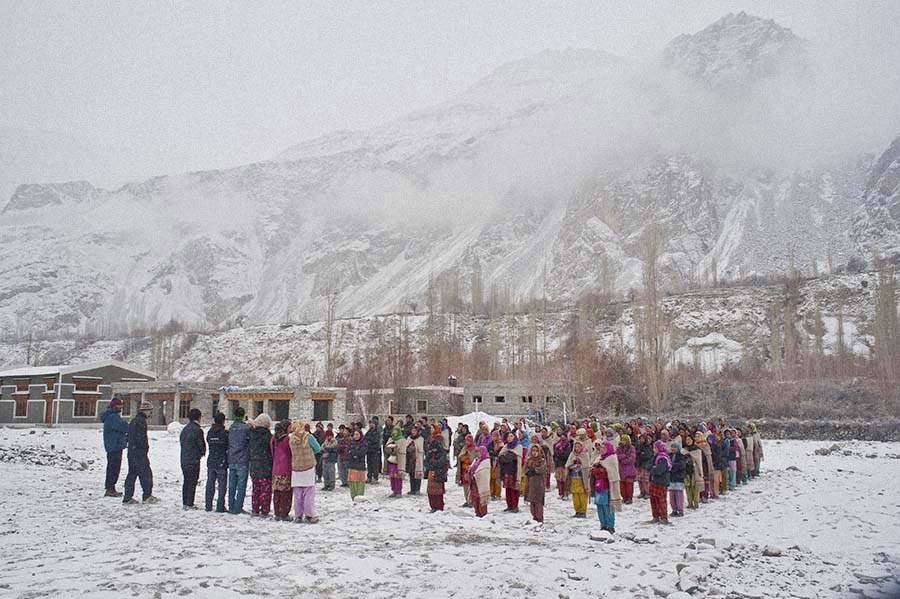
And once it was done, I left alone and walked, and walked for hours to other villages till the night fell. Photographing and writing all day long. Everything changed ever since the snow touched us. May be it opened us. It filled some color in us. We had forgotten about seasons, flowers, and shades.
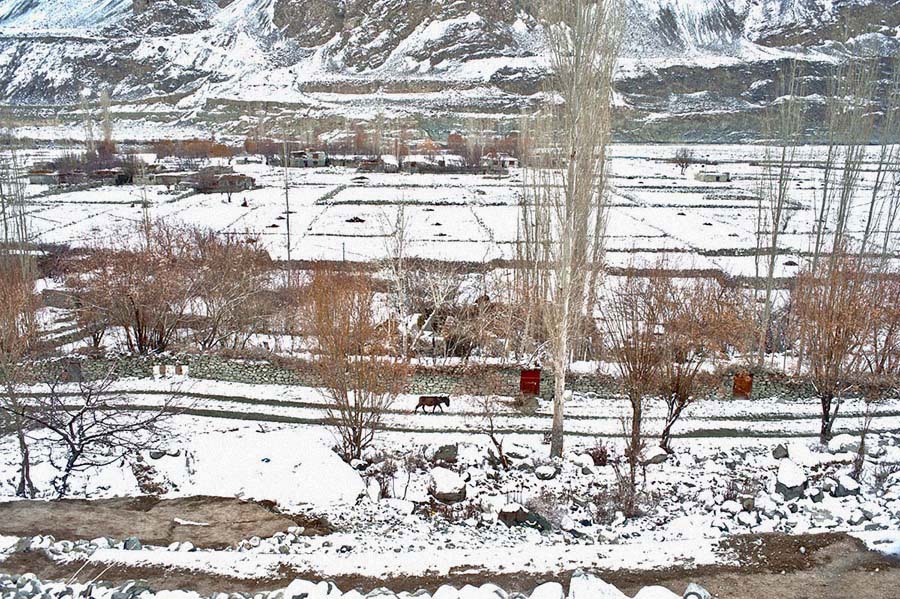



That day freed something, may be it opened children towards us. Because somehow I almost felt that i didn’t know this landscape. And I wanted to know. But to know that part of the earth, I had to know the moon. And to know the moon I had to become friends with my students. The choicest ones. The ones who looked at me as if I was their only hope. The ones who lead me to newer lanes. The ones who would waited without a sound. Naseer and Sajjad. My favourite students. If my days became synonymous with the night, it was because of them. On the other edge of the village, where there was the graveyard, there was also a very old, small Buddhist monastery on the hill. No body used to go there as it was haram. There came those nights when I was waiting for the waxing moon period, every month for six months, I took them along with me, in the night looking at the barren mountain, seeing faces in them watching us walking, when all valley had slept long ago, these boys showed me magic.
: ँ :
Today when i am here again, on the paths that are same but different i remember those children; few whom i met in my four hour stay in the village, I heard some unbelievable stories. Some good and some heart wrenching. Naseer, my favourite boy who walked with me since the day i set foot in this village, decided to hang himself a year after we had left. It was the saddest news, I had not anticipated something like this, and when i was the one who touched him, took him under my wing. It felt my failure. I was not prepared to hear this.
Hamida, The girl, who would never study but played her heart out that morning, turned out to be the one who would not marry, leave the village for a distant land. I learnt she was studying Psychology in Kashmir University, and does not want to come back.

Sajjad, my other favourite boy with Naseer, with whom we even made a film, Bongu with Rehmatuallah’s donkey, today is the only boy who is serving as an infantry in the Indian army. He was there when we arrived and stayed with me all along for those hours when i was there.

Abraham, our cook today runs his own restaurant. The moment he learnt i had come, he left everything, came to meet where i was and literally begged to come and have tea at his place. When i came, i told him i am hungry and would like to eat, he hesitated. As only snacks were available, but quietly he told someone to bring potato, tomato from the garden and he cooked the best food i have had from his hands again. I was so enamoured with so much meeting, looking, sharing that i forgot to take a selfie, i hardly do but photographed him cooking for me quietly.
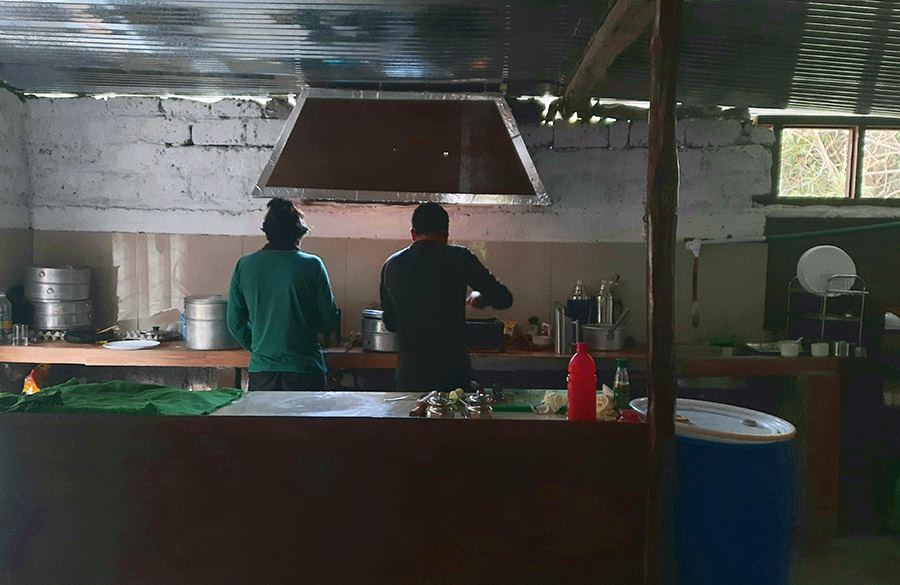
I cannot tell you how my sleep was that night. But i slept well. Even it was only about Naseer whom i missed but when i met father, Hussein, i felt better because he probably had moved on already long back.
Even though it was a long drive back home, but it was the most fulfilling one. All my co-travellers, my Road to Nara family, who all travelled with me, i thank you for being the most important part of this sojourn. I leave now with some images of my closest moments, and favourite people here, from the road.
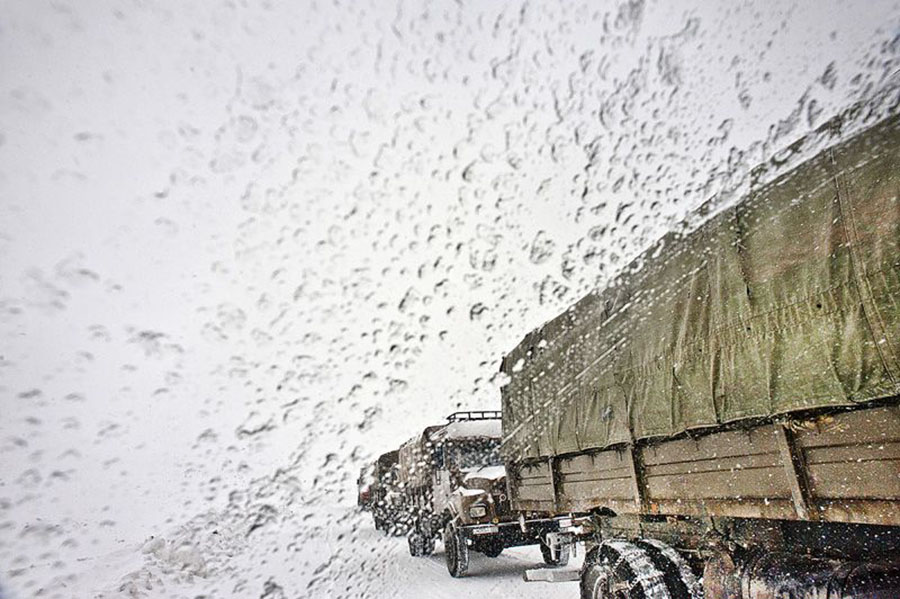
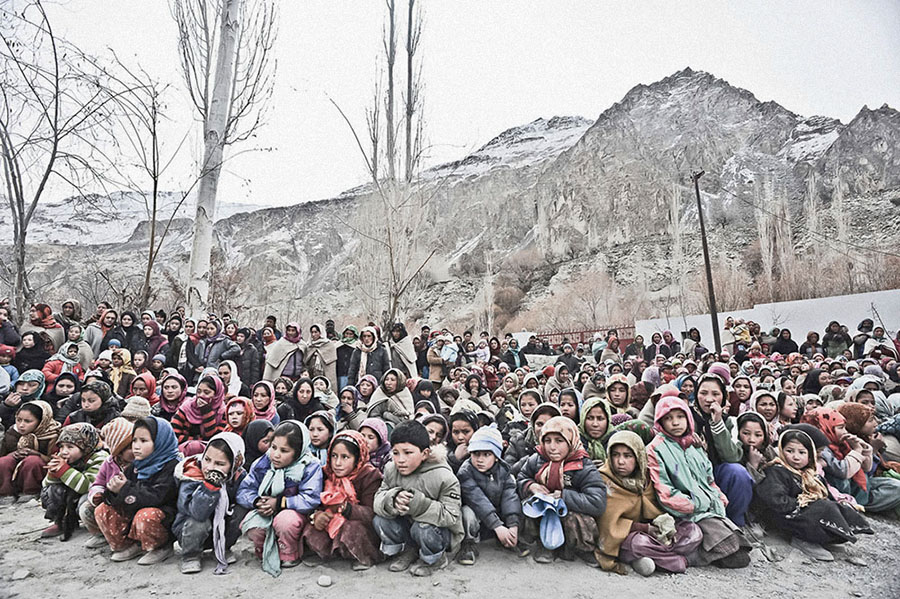




: ँ :
Thank you.
If today is the first time you have arrived on The Road to Nara, you are heartily welcome ~ Namaste
If you have any suggestions, please write in the comment box or feel free to write to me at narayankaudinya@gmail.com
: ँ :
I will take this opportunity to introduce you to About me and importantly;
As a co-traveller, my Ten Learnings from several years on the road, before you coarse on your own Road to Nara.
Also read: Top 9 Most Read Posts of 2022
: ँ :
Also, You will be happy to know about My Little School Project. If you wish to come over for a visit someday that you must, you will be heartily welcomed here
: ँ :
To visit other long-term photographic works, please visit here.
Follow my works and walks as I document Rural Indian Subcontinent on
Instagram | Facebook | Twitter
: ँ :


Oh dear Narayan, you take my heart and give to it such a gift. You bro are truly a master. peace and love from Oz!.
LikeLiked by 1 person
Sis, i cannot tell you how light i feel, now that these many things have been written. I can now, walk peacefully.
LikeLiked by 1 person
sis xo
LikeLiked by 1 person
your star bro !
I would like to meet you some day.
Narayan x
LikeLiked by 1 person
a great adventure!!! wish i could have the opportunity to have my own Road to Nara.
LikeLike
Thank you for writing Charly. Ha ha yes of course. And somewhere on the blog as i read that you wish to visit India, i may be that starting point.
LikeLiked by 1 person
Delighted that this adventure found you well, dear army man.
Narayan x
LikeLiked by 1 person
It’s definitely in my bucket list, Narayan. I dream of visiting those sights with the wife, and I surely will let you know if that adventure pushes thru!
LikeLiked by 1 person
How lovely, I think this would be the most awakening gifts you might give to her. Please do.
LikeLiked by 1 person
looking forward to it, Narayan! hopefully, sometime soon!
LikeLiked by 1 person
A deeply interesting story, well told. Thank you for sharing.
Gwen.
LikeLiked by 1 person
Delighted that you could read it Gwen. My eyes were on the word count and it ended to be a long one for wordpress or so i think.
LikeLike
Thank you again for your words.
Narayan x
LikeLike
This last instalment of the epic journey up north, into places that not many people, leave alone
tourists, venture, is again one of the best-written tales I read for a long time, apart from all previously written by the author, Narayan Tushar Kaudinya. Finding his destiny to teach and to be able to change the lives of others, and his own perception of who he is, and his impact on people is mesmerising to the readers. The description of the beauty of the valleys covered in the snow will stay in your mind forever. As will the photography, his own, that makes the story come to life with magnetic force.
I will have to come back as one review of this masterpiece is not enough!
Joanna
LikeLike
Joanna, thank you for your impeccable review. As i miss taking risks. I will be on the road again once some projects are done.
As you pointed out, teaching here was one of the finest opportunity that even i could sense as it turned out to be a life transforming experience for me. And i am so happy that it was shared in its very raw form with you.
LikeLike
Thank you.
Narayan x
LikeLike
After reading Narayan’s masterpiece three times, the overwhelming message of his essay is that education is the way to the understanding of the world, and the freedom of thought that
it gives you. The many exotic characters he skillfully portrays keep you drawn into the story, and with your interest awaken, no matter how many times you read it. As I have said a few times before, this hugely talented writer is destined to achieve the highest accolade any writer can –
The Nobel Prize For Literature.
Joanna
LikeLike
I imagine a lover of the language, as of nature like you can go to an extent of re-reading such a long tale. Education undoubtedly is the way for any young mind, but then ever we as travellers learn a lot many ways even after school. We must tell children that learning is daily, and that how we can make them fall in love for learning, could be the defining moment in their lives.
All my words fall short when i come across your statements. I humble thank you dear Joanna.
LikeLike
Thank you so much for uplifting my spirits on a gloomy day.
Narayan x
LikeLike
So glad I found your blog. Have always been fascinated by different cultures but I was always particularly drawn to the people of the Himalayas. Your story is deeply moving. XX
LikeLike
Caro, delighted to only read this from you, as i am more than glad to share the stories of my beloved Himalayas with you.
LikeLike
Hopefully i go deeper in years to come to learn myself first the knowledge what Himalayas have always been known for. Slowly slowly. Thanks again Caro. Thank you very much.
Narayan x
LikeLike
What a wonderful story. We spent a couple of days in Turtuk, in the summer mind you, so I really enjoyed this personal story and hearing more about the people. Maggie
LikeLike
Maggie, wow! I was so excited to read that you were there. You would exactly know what i meant when i was saying how hard is it to reach there, and when we talk about years ago.
LikeLike
Yes it was nothing like it was for you 10 years ago but it added up to a few different mini bases and rides in personal cars. The hardest part was that no one in Leh seemed to want to help us figure out the rides so we had to do it section by section on our own. Once there the guest house owner was very excited to help us out and make sure we had a good stay. It’s a fascinating place.
LikeLiked by 1 person
Absolutely fascinating. Did you also go to the Buddhist monastery?
Yes I have seen people in leh used to discriminate and hardly anyone used to take tourists after Diskit.
But lovely to know that you know Maggie. Thank you again for this.
Narayan x
LikeLike
Yes we went to Diskit too. One of my favourite monasteries!
LikeLiked by 1 person
Diskit monastery is magnificent.
But I was talking about the monastery in Turtuk! 😊
LikeLike
Oh no! We didn’t know about it! Too bad
LikeLiked by 1 person
Here’s our post from that trip. It’s quite long. http://monkeystale.ca/2018/08/20/ancient-sites-in-the-indus-and-nubra-valleys/
LikeLiked by 1 person
Oh thank you for sharing. I ll read it Maggie. You ll know.
LikeLike
Very happy and motivating Maggie, Thank you again.
Narayan x
LikeLike
Also maggie if i may share a post more of Turtuk, you might like to read an episode before and how it started.
It will be great even if you just read it, hardly matters you review it or not. Here:
https://road-to-nara.com/2021/10/09/the-wait-of-baltistan-remembering-love-and-finding-lessons-while-teaching-in-the-border-village-of-turtuk-vi/
LikeLike
Thank you again. Narayan x
LikeLike
What a journey, Narayan! What a harsh living environment but beautiful landscape! Your following observation about living without mirrors for six months brought to mind my own experience of seven years of convent life without mirrors: “And to not see oneself for six months, slowly, strangely helped in unknowing me, of what I had known till then of my physical self slowly started melting away to more important learnings.” How true! When we let go of our self-absorption with our own mirror-image–so prevalent these days on our social media platforms–we are better able to focus not only on our interior being but also on the inner beauty of those around us.
LikeLike
Rosa, thank you for writing, as i missed reading from you in the last post as it was where this post started. Let me share it with you here, it will be great to know how and what in it you will see:
https://road-to-nara.com/2021/10/09/the-wait-of-baltistan-remembering-love-and-finding-lessons-while-teaching-in-the-border-village-of-turtuk-vi/
LikeLike
It is lovely how you see it Rosa, with your personal experiences you definitely know where i could be coming from. And six months is nothing compared to seven years, O my!
And probably it was this that triggered deep rooted change, which is what making you explore even more now.
Happiest to know a little more about you Rosa.
Thank you very much.
Narayan x
LikeLike
What a wonderful and fascinating story. Beautiful photos. I am fascinated to learn about people who live in different places and in different ways than myself. It is good for me to see life outside my little world. Thank you and Blessings to you! 🙏
LikeLike
Lisa, i am so happy to be reading these words from you. They uplift me.
It is so true that even after thousands of years how people are still living so isolated, so different. You are absolutely right.
LikeLiked by 1 person
And you blessings are heartily accepted dear Lisa. Thank you so much again.
Narayan x
LikeLike
And your blessings are heartily accepted dear Lisa. Thank you so much again.
Narayan x
LikeLiked by 1 person
Thank you Narayan, for sharing this journey back to a different time in your life. That was a time of discovery for you . I know that , in a way, we can never go back but you did go back, physically at least. The photos are marvelous. Those faces!
LikeLike
Anne, thank you so much for writing. One part of me has started acknowledging, every time i start writing about animals, i think of you. So thank you for this awareness.
I really thought what would you think about the dog story.
LikeLiked by 1 person
The dog story is distressing but to be honest many animals including horses,donkeys and other working animals suffer tremendous abuse that is born of ignorance in the developing world. A lack of education causes people to stick with old and horrible practices that ttheybthink will heal their animal. Not sure why the dog met this fate but it may have been something like that.
LikeLiked by 1 person
That is true.
Well I could imagine what that dog was the suppression of so many emotions transferring to this.
LikeLiked by 1 person
You are probably right about that.
LikeLiked by 1 person
Thank you again.
Narayan x
LikeLiked by 1 person
Thank you for telling your story. I was swept into a world that I’ll almost certainly never experience in real life. Your story is full of caring, and beauty, and love. And your photography of course is magnificent and I’m not remotely surprised you won awards for it.
Alison
LikeLiked by 2 people
Alison, how lovely to have you here. It is only your empathy and love that you could sail into this world. It was certainly a lengthy story. Yes, care and love because i was there to uplift children, to touch their hearts before minds.
LikeLiked by 1 person
🙏💕💕
LikeLiked by 1 person
Thank you so much again. I humbly appreciate it. Narayan x
LikeLiked by 1 person
I absolutely loved reading this. While some parts were very saddening, I enjoyed the education of the area, the tales of the people and the highlights with people you cared about/who cared about you. My how much time has flown since 2011.
LikeLike
Lovely to have you J. I cannot tell you how much Cricket, football we played with these kids, and that was the moment when we cracked open our relationship with them.
I mentioned it as i read your bio and ofcourse short but one gets the jist of your passion. I love sports. I run, walk, wrestle daily almost.
Anyways, delighted to have your presence probably for the first time.
LikeLiked by 1 person
can’t wait to talk with you more. Thank you for reading the bio. looking forward to talking with you more
LikeLike
Certainly J. It shall be done.
LikeLiked by 1 person
Thank you again. Will come over soon.
Narayan x
LikeLiked by 1 person
M❤️NAY
BRO
LikeLike
Thank you brother. Love to you
Narayan x
LikeLiked by 1 person
May you be safe and into your inna and well been connected to the outa light
… whereever you are
whatever you do
whenever you need
Wholeheartily thanks for what and who you are
LikeLike
How lovely you are. Blessed.
Thank you so much.
Narayan x
LikeLiked by 1 person
Your experiences in Turtuk are for many experiences never achieved in a lifetime. Thank you for sharing these with us, and showing us the natural beauty of the Karakorum Mountain range, but also the difficult lives many of those who live in Baltistan have. A life with minimal, the most sad are minimal opportunities. From experiencing a heroes welcome on arrival, to wrapping your life around noble goals and taking the difficult “road to Nara.” The lives you touched, made better even if only briefly are to be celebrated. Beautiful writing, Narayan, how I long to see and experience such places and am able to through your writing. Take care ~
LikeLiked by 1 person
Thank you for your words Randall. Karakorum is harsh and it starts seeing on our skin within days.
But things are better now here. Tourists, travelers started coming and helped village people to do many never done before things.
You delighted me with your review of this post. Thank you.
LikeLike
Also I wanted to share this that we all are on our personal road to Nara. Nara meaning water, rather the way of the water. So we all are kind of finding that way how water flows, which is also what my name means.
Narayan x
Thank you again, Randall.
LikeLike
And please do plan to come to the Himalayas.
LikeLike
What a pleasure and a privilege to have read this, Narayan, and to have followed you to the end of your journey. Your photography, again, as always, adds such a deeply moving and personal dimension to your words, bringing the whole experience ever more alive. You have crystallised a moment and a people, and in such fine detail, and preserved it forever. You also explain very well how your time in this astonishing part of the world was such a transformational experience for you.
LikeLiked by 1 person
It is my honor Michael. Delighted that you could read it. Yes absolutely, I do believe this changed the course. Probably how I keep catching up with this time in places I travel to is foolish, but I knew at least where things must lead to.
Thank you again Michael.
LikeLiked by 1 person
Croston Moss, on the Lancashire Plain, 2019, after heavy rains. The soft undulations of familiar meadows fill to form unexpected lakes, and the landscape becomes ethereal in the morning light.
LikeLiked by 1 person
Dear Narayan, this post excites me, frightens me, moves me to think of a world so different to my cosy life. I’m almost wordless and find myself humming inside, a strange noise, an unknown mantra, perhaps a prayer to all the people of this world who I will never meet.
“Love all God’s creation – the whole of it….Love every leaf, every ray of light. Love the animals, love the plants, love everything. If you love everything, you will perceive the mystery of God in all….you will come at last to love the whole world with all-embracing love”. Fyodr Dostoevsky (1821-1881)
LikeLiked by 1 person
Dearest Ashley, I am so delighted to read this beautiful review by you.
And most of all your inspiring sentences. Love is, and can be only power that can churn. I wholly believe in it and once I read it, it inspired me to surrender more.
LikeLike
Thank you again Ashley. Dostoevsky was like a great grandfather if we can call of writing.
LikeLike
Thank you for bringing us closer to a part of the world so many of us don’t know much about. Your inspirational writing provides such interesting information. You make us aware of the harsh conditions and circumstances people have to contend with and your beautiful photographs help us connect with them .
LikeLiked by 1 person
Thank you Eliana. Your presence delighted me.
You are right and for once I will accept that I like this work of mine amongst all.
Thank you so much again.
Narayan x
LikeLike
Your writing is so different from anything I have read. It is your heart that takes you to these places to hear stories of people who were never seen before nor heard. This is beyond incredible. Through your travels and writings you bring a multitude of emotions. Road to nara is actually nara is road, you are the journey, the journey is you, if I may say.
LikeLiked by 1 person
Lekha, how you put it into words is so eloquent that I rather not take it seriously.
Am I the journey!! Woa.
My wishes dearest Lekha
Narayan
LikeLiked by 1 person
🙂
LikeLike
Your photos are incredibly beautiful. Thank you for your words too, what a life!
LikeLiked by 1 person
Susan, lovely to read this. Makes me very happy. Thank you.
LikeLike
And please if you can Plan a visit to the Himalayas too. You know where to knock for directions now 😊
Narayan x
LikeLiked by 1 person
Thanks! I spent 6 months in Sikkim around Darjeeling area many years ago and was in heaven. Was always curious about the other side.
LikeLiked by 1 person
The finale of this great journey carried a mixed bag of feelings. While the stories of 13 poodi baba and that athletic girl elated me, I was saddened to hear the stories of Naseer’s suicide and children mercilessly.killing a dog. I appreciate you and your endeavour for the good of that remote village and its pathetic state. Thank you for sharing this beautiful journey along with amazing pics.
LikeLike
I am grateful kaushal Ji that these stories did carry you with them. You are right in stating the condition of these villages under which they were shaping. Thank you for coming along on this journey to Baltistan Kaushal Ji.
LikeLiked by 1 person
Thanks very much again.
Narayan x
LikeLiked by 1 person
It was my pleasure, Narayan ji.
LikeLiked by 1 person
That’s such an intense account of the region. It’s sad in some ways and heartening in the others. Sometimes ignorance is bliss, at other times it is a silent killer.
LikeLike
Ambica, lovely to read from you. Yes, in these times i also feel being ignorant is not that bad.
LikeLike
Also i was half way reading your mumbai account then got distracted somewhere. It was lovely to remember my first days in bombay. As it were memorable and exciting.
LikeLike
I love Mumbai too. For a Delhi person, it’s liberation 😁
LikeLike
But thank you for reading and sharing your view, i imagine it was a long read. Thank you again.
Narayan x
LikeLike
Reblogged this on The Wild Coach and commented:
Story and Photos that will transport you
LikeLike
Well, thank you. Even though i would have liked that you should have asked before re-blogging once. Feels good to have a conversation out of courtesy.
LikeLike
But, thank you.
Narayan x
LikeLike
I can understand why your poignant personal story as a teacher was published numerous times. You have exposed me to a completely different world and experience. Your photos are simply amazing. I keep on going back to the one of the all children crouched down with the stark mountains in the background and the one of the hands.
LikeLike
Caroline, how lovely of you to write so positively about it. It was a special, magical place. It still is. And well, much more equipped to welcome travellers like you. I even taught them to do ‘Yo man, whats up?’ 🙂
LikeLiked by 1 person
Thank you so much again for your generous comments.
Narayan x
LikeLike
Jaw-dropping post. Wonderful.
LikeLike
Completely missed it dear Shehan. Thank you for writing. It certainly was a jaw-dropping experience under a warm monkey cap.
LikeLike
Thank you again
Narayan x
LikeLike
Reblogged this on War and Peace: 'Fighting the war to <strong>win the peace.' and commented:
http://www.foreigncorrspondent.wordpress.com
http://www.peaqcepursuit.wordpress.com
“When (or if ever) you arrive in heaven, let faith, hope and love be the wings that carried you there.”
– as adapted from the inspiring words of Jonathan Edwards, former minister in New England, Massachusetts
http://www.craigsquotes.wordpress.com
LikeLike
Good for you Craig. Hope it helps.
LikeLike
Thanks for writing and sharing.
LikeLike
This is very powerful. What experiences! Thanks for writing this, it will change my view of Turtuk when I go back
LikeLike
I J, I was delighted to know that you read it before I could share the link. But first apologies for writing this late. I had been travelling and later had to finish some deadlines.
Had you had read and I had known, I could have arranged your stay and even company in Turtuk. That village is like my own. Kids have grown now and working.
Please write whenever you make plans. Thanks again for writing.
LikeLiked by 1 person